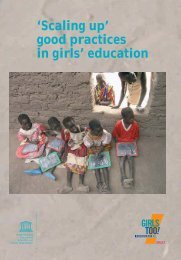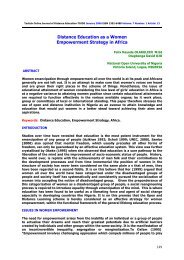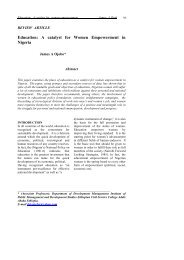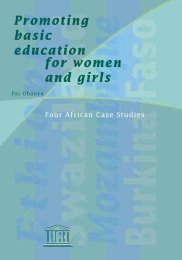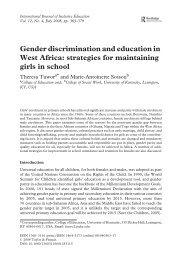Making Schools Safe for Girls - library.unesco-ii...
Making Schools Safe for Girls - library.unesco-ii...
Making Schools Safe for Girls - library.unesco-ii...
- No tags were found...
You also want an ePaper? Increase the reach of your titles
YUMPU automatically turns print PDFs into web optimized ePapers that Google loves.
While highlighting a phenomenon that undermines girls’ education, thisstudy does not seek to demonize schools or teachers. The majority of teachersin Benin and across the continent are serious, dedicated, and hard-working.Moreover, girls not in school remain more at risk of gender-based violence,pregnancy, and HIV/AIDS infection than those who are enrolled. Thisstudy seeks only to emphasize that schools are not always safe havens fromgender-based violence and that gender-based violence at school underminesgirls’ academic enrollment, achievement, and retention. Until projects andpolicies targeting girls’ education acknowledge the role gender-based violenceplays in schools, the promise of girls’ education may remain elusive.Ef<strong>for</strong>ts to Address Gender-BasedViolence in Beninese <strong>Schools</strong>Evidence suggests that Benin, like many of its neighbors, faces a phenomenonof gender-based violence in its schools. Since 1994, the World Bank,the Women in Development office of USAID-Benin, and the United NationsCommittee on the Rights of the Child have each recognized sexual harassmentin schools to have a limiting effect on girls’ enrollment and participationin Beninese schools. NGO ef<strong>for</strong>ts and policy developments in Beninhave taken preliminary steps to target the problem.Inappropriate sexual relationships between students and teachers were firstaddressed by a 1988 Ministry of Education policy. While the policy has beenen<strong>for</strong>ced only rarely, two of its provisions are striking. First, it set a tougherpenalty <strong>for</strong> a teacher who attempted abortion on a student than <strong>for</strong> a teacherwho had raped a student. Second, it is significant that the policy specificallyaddressed students who provoke teachers with “extravagant” hairstyles andperfumes. The policy thus seems to have been intended to preserve a particularconception of morality as much as to create a safe school environment,and it evinces a “blame the victim” understanding of sexual harassment.While the policy response to sexual harassment in schools has proved ineffective,the problem has grown in Benin. Women in Law and Development5




